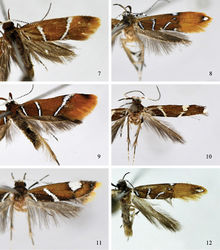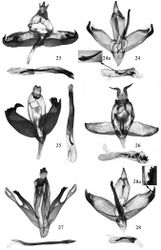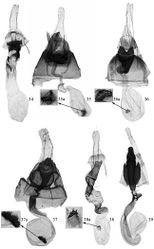Difference between revisions of "Promalactis strumifera"
m (Imported from ZooKeys) |
m (1 revision) |
(No difference)
| |
Latest revision as of 09:22, 5 April 2013
| Notice: | This page is derived from the original publication listed below, whose author(s) should always be credited. Further contributors may edit and improve the content of this page and, consequently, need to be credited as well (see page history). Any assessment of factual correctness requires a careful review of the original article as well as of subsequent contributions.
If you are uncertain whether your planned contribution is correct or not, we suggest that you use the associated discussion page instead of editing the page directly. This page should be cited as follows (rationale):
Citation formats to copy and paste
BibTeX: @article{Du2013ZooKeys285, RIS/ Endnote: TY - JOUR Wikipedia/ Citizendium: <ref name="Du2013ZooKeys285">{{Citation See also the citation download page at the journal. |
Ordo: Lepidoptera
Familia: Oecophoridae
Genus: Promalactis
Name
Promalactis strumifera Du & Wang, 2013 sp. n. – Wikispecies link – ZooBank link – Pensoft Profile
Type material
Holotype ♂ − China, Zhejiang Province: Mt. Jiulong (28°21'N, 118°52'E), 400 m, 5.VIII.2011, coll. Linlin Yang & Na Chen, genitalia slide No. DZH12050 (NKU). Paratypes − 1 ♂, same data as holotype except dated 4.VIII.2011; Zhejiang Province, Wuyanling (27°42'N, 119°39'E), Taishun County: 1 ♂, 400 m, 1.VIII.2005, coll. Yunli Xiao; 4 ♂, 680 m, 28.VII−2.VIII.2005, coll. Yunli Xiao; 2 ♂, 790 m, 2, 3.VIII.2007, coll. Qing Jin. Guangdong Province: 2 ♂, 1 ♀, Nanling (23°20'N, 115°23'E), Shaoguan City, 7−14.VII.2007, coll. Min Wang et al. Fujian Province: 9 ♂, 4 ♀, Sangang (27°45'N, 117°40'E), Mt. Wuyi, 740 m, 26, 27.VII.2008, coll. Weichun Li, Yongling Sun & Haiyan Bai. Guangxi Zhuang Autonomous Region: 3 ♀, Qinmu village, Yongfu County (24°59'N, 109°59'E), 160 m, 5.V.2008, coll. Li Zhang & Hui Zhen; 1 ♀, Hongqi Forest Farm, Shangsi County (22°09'N, 107°58'E), 260 m, 2.IV.2002, coll. Shulian Hao & Huaijun Xue; 1 ♀, Fubo Forest Farm, Pingxiang City (22°07'N, 106°44'E), 550 m, 1.VIII.2011, coll. Bingbing Hu et al., genitalia slide Nos. W05010 ♂, W05028 ♂, DZH11063 ♀, DZH12051 ♀, DZH12052 ♂ (NKU). Jiangxi Province: 1 ♂, Dayu County (25°23'N, 114°22'E), 15.VI.1976; 1 ♀, Dayu County, 14.VIII.1976; 1 ♂, Xingguo County, 19.VII.1976. Hunan Province: 1 ♂, Suoxiyu (29°35'N, 110°57'E), 17.X.1988, genitalia slide Nos. DZH12033 ♂, DZH12034 ♀(IOZ).
Diagnosis
This species is similar to Promalactis fascispinata Du, Li & Wang, 2011, but can be separated by the rectangular gnathos, the dorsal lobe of the valva bifurcate distally and the ventral lobe with two digitate distal processes, and the juxta without spines in the male genitalia. In Promalactis fascispinata, the gnathos is tongue shaped, the dorsal lobe of the valva is not bifurcate and the ventral lobe has two elongate ovate distal processes, and the juxta has an ovate cluster of fine spines distally in the male genitalia.
Description
Adult (Fig. 11). Wingspan 8.0−11.5mm. Head with vertex shining white, frons shining leaden, occiput dark ochreous brown. Labial palpus with basal and second segments yellow on inner surface, ochreous brown on outer surface; third segment black, almost same length as second. Antenna with scape white; flagellum white except several distal flagellomeres dark brown on dorsal surface, dark brown on ventral surface. Thorax and tegula dark ochreous brown. Forewing ground colour ochreous brown tinged with dark ochreous brown, sometimes scattered with black scales on lower angle of cell; costal margin greyish black along basal 3/4, with a large rounded white spot at distal 1/4, slightly across middle of wing, edged with dense black scales except on anterior margin; two parallel oblique white streaks arising from dorsum, edged with dense black scales: basal streak from dorsal 1/5 to base of fold, second streak from beyond middle of dorsum to basal 1/3 of upper margin of cell, area ferrugineous between two streaks; dense black scales extending from apex along termen to tornus, forming a narrow black apical band; cilia yellow, dark greyish brown along distal part of costal margin, dark grey along distal part of dorsal margin. Hindwing and cilia grey.
Male genitalia (Fig. 27). Uncus stout, heavily sclerotized, sinuate marginally, with a heavily sclerotized, short, triangular apical process at middle; basal 2/3 open ventrally. Gnathos heavily sclerotized, rectangular, densely with warts, blunt at apex: right side concave in U shape near apex; lateral arm almost same length as gnathos, broad, nearly semicircular basally. Tegumen narrowly elongate, almost parallel laterally, branched from posterior 3/10, blunt anteriorly. Valva narrow, almost parallel dorso-ventrally; costa projected at middle, concave near apex; apex bilobed: dorsal lobe short and sclerotized, bifurcate distally, forming two thick spines, dorsal spine short, about 1/3 length of ventral spine, with a brush of setae between two spines; ventral lobe elongate, about 1.4 times length of dorsal lobe, weakly sclerotized, very narrow basally, broadened gradually, distally setose, bifurcate, forming two slender, digitate processes: dorsal process straight, ventral process slightly shorter than dorsal process, curved dorsad distally. Sacculus with basal 3/5 broad and almost parallel sided, distal 2/5 gradually narrowed to base of ventro-apical lobe of valva. Saccus slightly shorter than uncus, somewhat semi-oval. Juxta strong, rod-like, curved dorsad at basal 1/3, with a small awl-shaped process at base, apex narrowly rounded or bluntly pointed, reaching near posterior margin of tegumen; diaphragm with large sclerotized rumples dorsally, enlarged and protruded leftward. Aedeagus almost straight, basal 2/9 slender, slightly curved at 2/9; distal 7/9 broad, uniformly thick, apex pointed; cornutus absent.
Female genitalia (Fig. 35). Apophysis anterioris stronger, about 1/3 length of apophysis posterioris. Eighth tergum sclerotized, nearly trapezoidal, convex antero-laterally, sinuate and with sparse long setae on posterior margin. Seventh abdominal segment sclerotized, laterally with a nodular process at anterior 2/5, posterior margin serrate, sometimes with large lateral tooth. Ostium bursae heavily sclerotized and large. Lamella postvaginalis with dorsal part broad leaf-like, posterior margin serrate and with sparse setae, produced to a sclerotized, ovate process at middle, margined with small teeth; ventral part with two lateral processes: left process with basal 1/3 narrow, distal 2/3 abruptly broadened, with ten spines of varied length; right process nearly spine-like, slightly curved at base. Lamella antevaginalis heavily sclerotized, very short, nearly band shaped, anterior and posterior margin convex at middle. Antrum very short, nearly funnel shaped. Ductus bursae curved, slightly longer than corpus bursae, membranous, posterior 3/5 thin, with discontinuous, weakly sclerotized bands, anterior 2/5 enlarged, with a weakly sclerotized, thin ring at anterior 2/5; ductus seminalis arising from anterior 2/5 of ductus bursae. Corpus bursae nearly oval, membranous, with dense granules; a small and rounded signum bearing one larger and one smaller conical spines, with a shield-like, weakly sclerotized plate at base.
Distribution
China (Fujian, Guangdong, Guangxi, Jiangxi, Zhejiang).
Etymology
. This specific name is derived from Latin strumifer (= nodular), referring to the lateral nodular process at anterior 2/5 of the 7th abdominal segment in the female genitalia.
Original Description
- Du, Z; Wang, S; 2013: Genus Promalactis Meyrick (Lepidoptera, Oecophoridae) from China: Descriptions of twelve new species ZooKeys, 285: 23-52. doi
Images
|


